Backtracking
| Permutation | Combination |
|---|---|
| Order matters | Order does't matter |
| lock | fruit salad |
Permutation
- Order matters
- For permuation, loop should start from i = 0.
Permutation with repetition
- N^R different possibilities
- e.g. Given red, blue, orange, how many permutations are there to fill up 2 containers? 3^2

private List<List<Integer>> result;
private List<Integer> intermList;
public List<List<Integer>> permutationWithRepetition(int[] colors) {
result = new ArrayList<>();
intermList = new ArrayList<>();
permutationWithRepetition(colors, 2, 0);
permutationWithRepetition2(colors, 2);
}
private void permutationWithRepetition(int[] colors, int containerDepth, int depth) {
if (depth == containerDepth) {
result.add(new ARrayList<>(intermList));
return;
}
for (int i = 0; i < colors.length; i++) {
intermList.add(colors[i]);
permutationWithRepetition(colors, depth + 1);
intermList.remove(intermList.size());
}
}
private void permutationWithRepetition2(int[] colors, int containerDepth) {
for (int i = 0; i < colors.length; i++) {
intermList.add(colors[i]);
if (intermList.size() == containerDepth) {
result.add(new ARrayList<>(intermList));
intermList.remove(intermList.size());
conitnue;
}
permutationWithRepetition2(colors, containerDepth);
intermList.remove(intermList.size());
}
}
Permutation without repetition
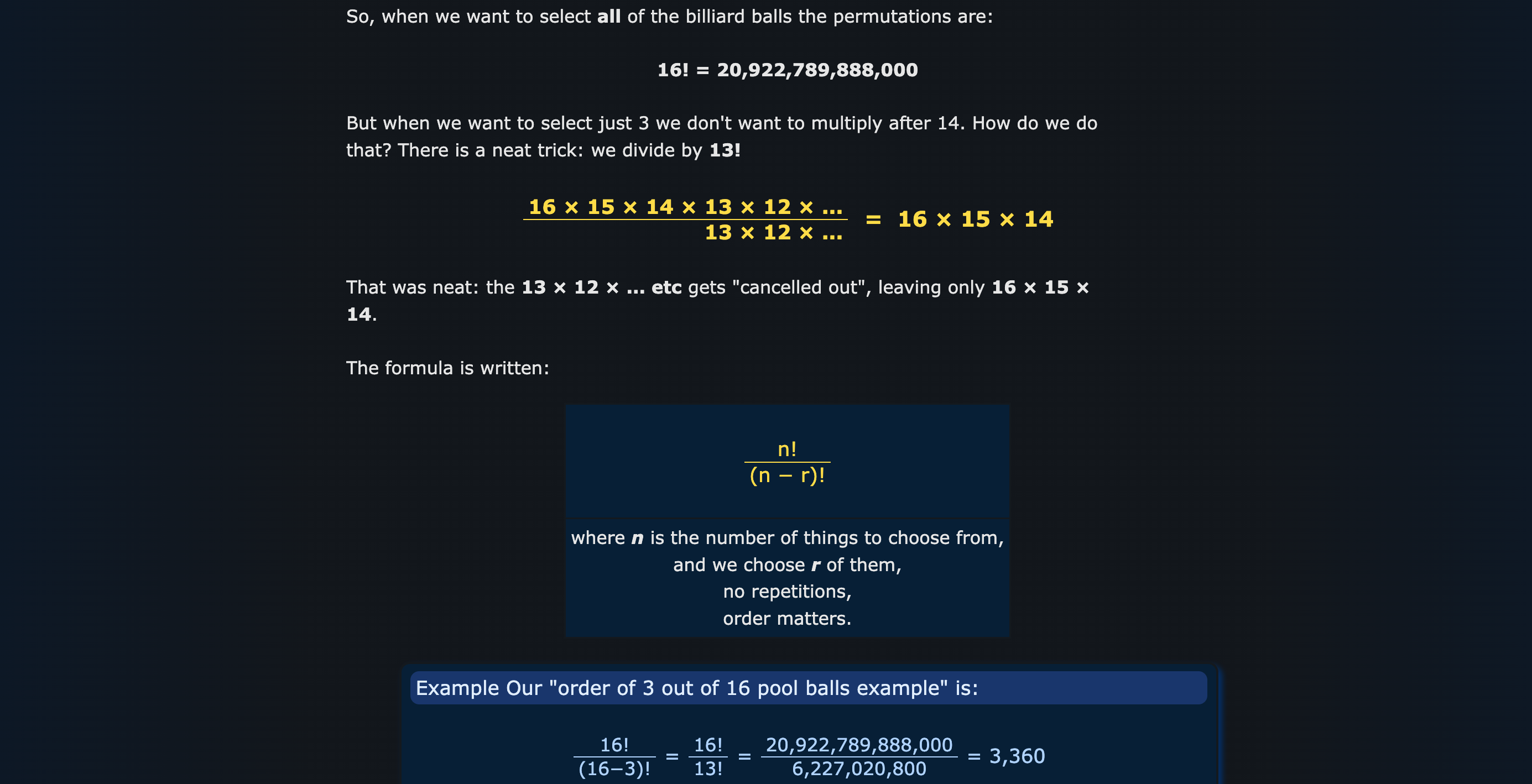
- N!/(N-R)!
- Given red, blue, orange, how many permutations are there to fill up 2 containers without using one color more than once?

The following problem is from Leetcode - 46. Permutations Given an array nums of distinct integers, return all the possible permutations. You can return the answer in any order.
Input: nums = [1,2,3]
Output: [[1,2,3],[1,3,2],[2,1,3],[2,3,1],[3,1,2],[3,2,1]]
- Time complexity: O(N * N!)?
- Space complexity: O(N!)
Would the following code work?
private void permute(int[] nums, int curI) {
if (set.size() == nums.length) {
result.add(new ArrayList<>(set));
return;
}
if (curI == nums.length) return;
for (int i = 0; i < nums.length; i++) {
int curVal = nums[curI];
if (!set.contains(curVal)) {
set.add(curVal);
permute(nums, curI + 1);
set.remove(curVal);
}
}
}
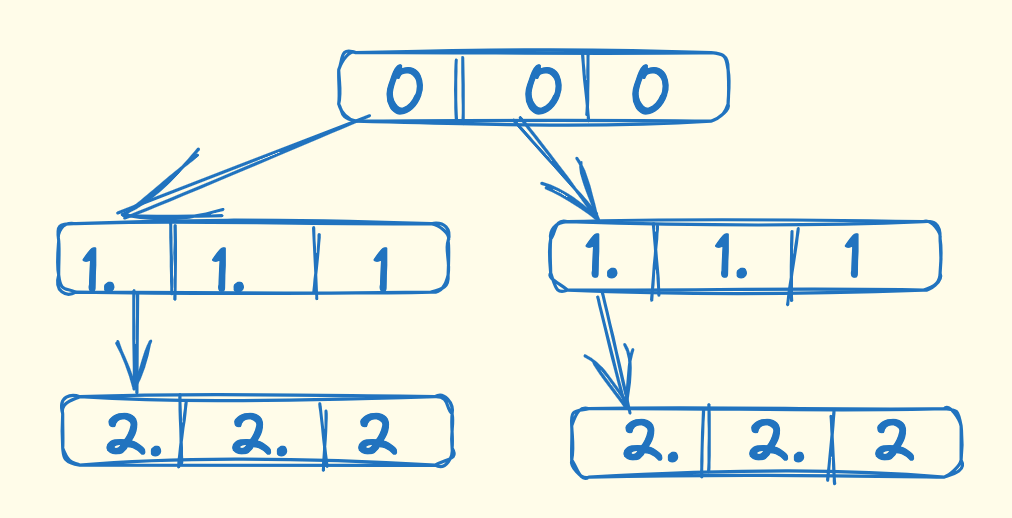
It doesn't work, because the set does not store chronological order unlike list. Also, there's a major bug here about the way tree is created. The following fixes the tree structure, but the set is still there.
private static void permute(int[] nums, int curI, Set<Integer> set,
List<List<Integer>> result) {
if (set.size() == nums.length) {
result.add(new ArrayList<>(set));
Util.print(result);
return;
}
for (int i = 0; i < nums.length; i++) {
int curVal = nums[i];
if (!set.contains(curVal)) {
set.add(curVal);
permute(nums, curI + 1, set, result);
set.remove(curVal);
}
}
}
How about this one?
public List<List<Integer>> permute(int[] nums) {
interm = new ArrayList<>();
result = new ArrayList<>();
permute(nums, new boolean[nums.length], 0);
return result;
}
private List<Integer> interm;
private List<List<Integer>> result;
private void permute(int[] nums, boolean[] seen, int depth) {
if (depth == nums.length) {
result.add(new ArrayList<>(interm));
return;
}
for (int i = 0; i < nums.length; i++) {
if (seen[i] == false) {
seen[i] = true;
interm.add(nums[i]);
permute(nums, seen, depth + 1);
interm.remove(interm.size() - 1);
seen[i] = false;
}
}
}
This one works because it's the right tree like below. The time complexity is n! from the recursive calls and n is multiplied on every end of the n! branch to copy the result.
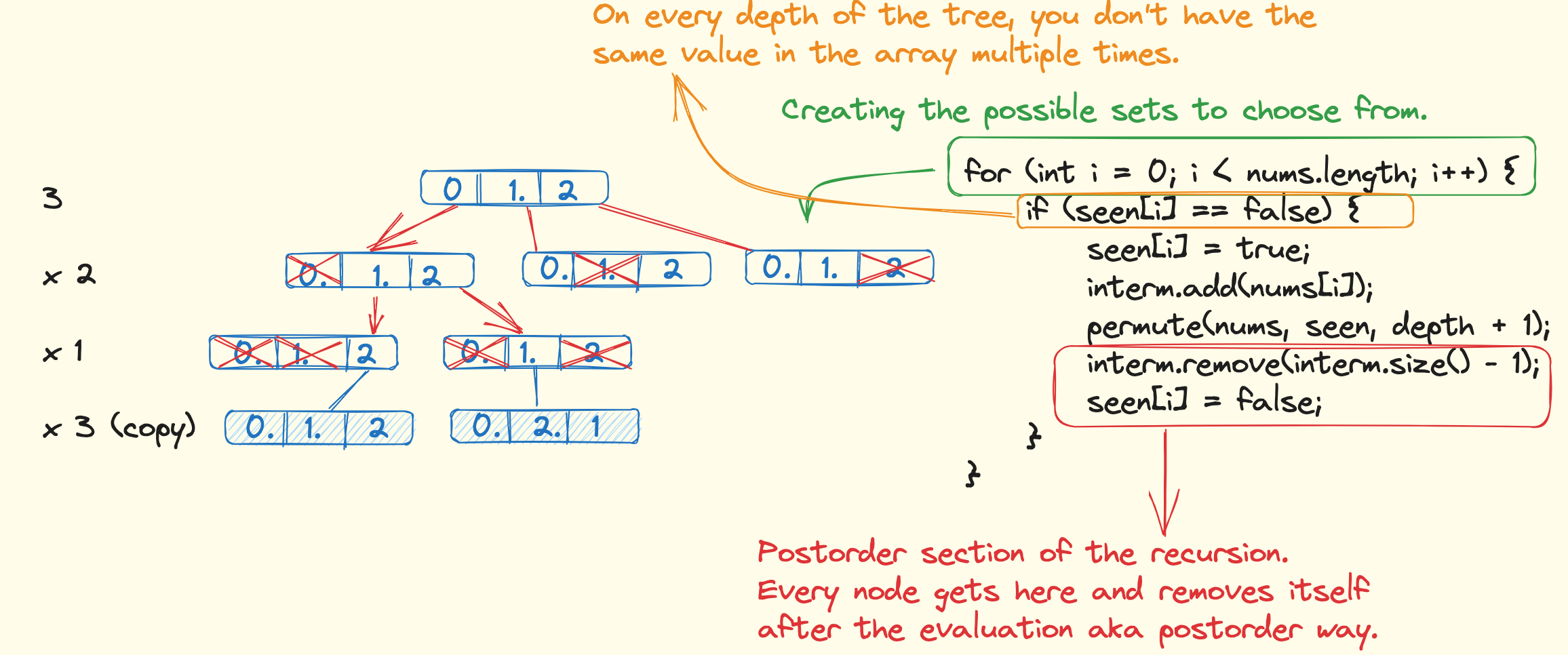
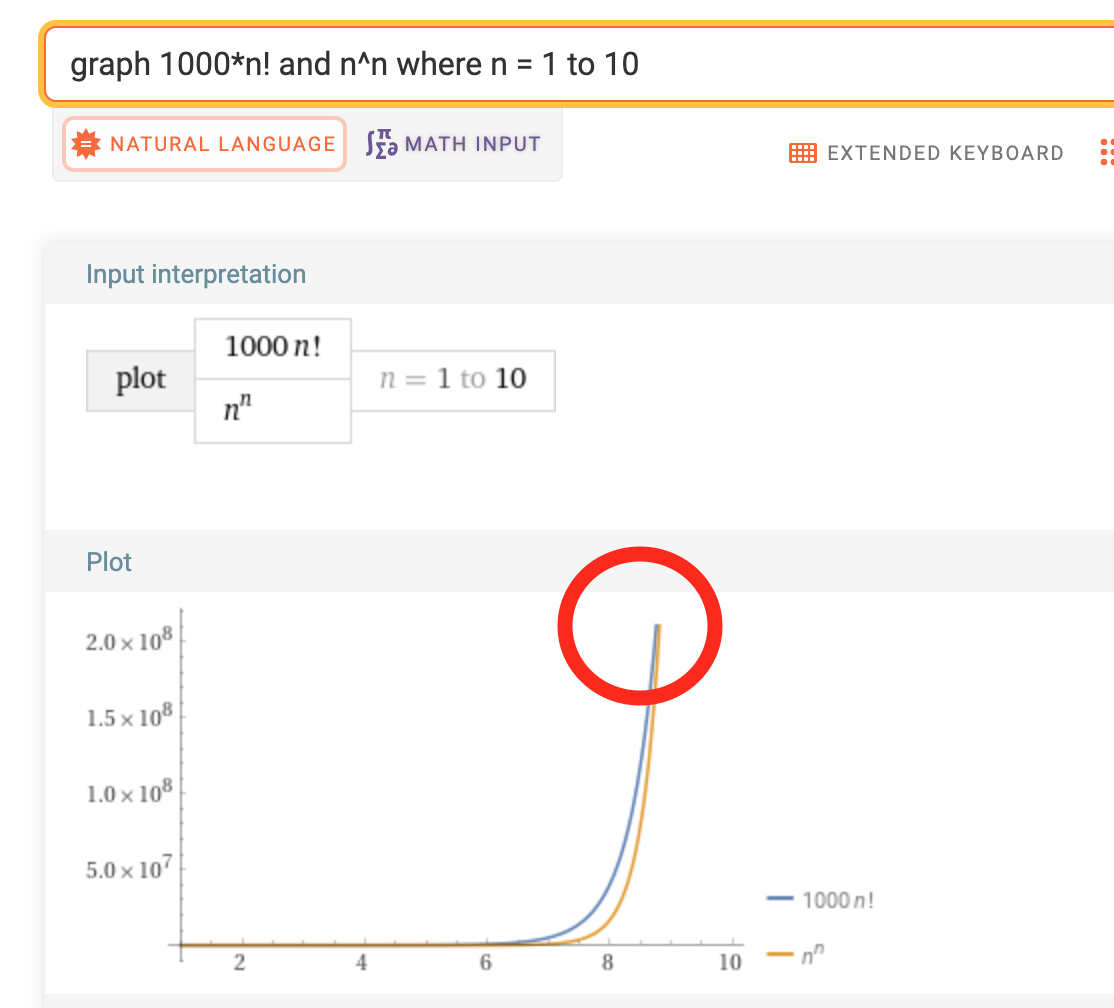
How about this one
private void permute(int[] nums, List<Integer> interm, List<List<Integer>> result, boolean[] visited) {
for (int cur = 0; cur < nums.length; cur++) {//cur =2
if (visited[cur] == true) continue;
interm.add(nums[cur]); // 3
visited[cur] = true; //
if (interm.size() == visited.length) {
result.add(new ArrayList<>(interm));
visited[cur] = false;
interm.remove(interm.size() - 1);
return;
}
permute(nums, interm, result, visited);
interm.remove(interm.size() - 1);
visited[cur] = false;
}
}
This one works too. This one short circuits without going one more level deeper to stop the recursion.
- Time complexity: O(N * N!)
- Space complexity: O(N N!) = O(N) for the recursion stack depth and O(N!N) for the result.
Permutation with duplicate values in the set
- N!/(R1!*R2!) where R1 and R2 are duplicate values.
- Given ABBCC, how many permutations are there to rearrange ABBCC? 5!/(2! 2!)
- Identical to the permutation code except saving the result in the set instead.
public List<List<Integer>> permuteUnique(int[] nums) {
Set<List<Integer>> set = new HashSet<>();
perm(nums, new ArrayList<>(), set, new boolean[nums.length], 0);
return new ArrayList<>(set);
}
private void perm(int[] nums, List<Integer> interm, Set<List<Integer>> result, boolean[] visited, int level) {
if (level == nums.length) {
result.add(new ArrayList<>(interm));
return;
}
for (int i = 0; i < nums.length; i++) {
if (visited[i] == true) continue;
visited[i] = true;
interm.add(nums[i]);
perm(nums, interm, result, visited, level + 1);
interm.remove(interm.size() - 1);
visited[i] = false;
}
}
* Time complexity: O(N * N!) assuming the case where there's no duplciate. With duplicate it would be something like N!/(R1!*R2!) where R1 and R2 are duplicate values and you have to multply N to the whole thing to copy the result.
* Space complexity: O(N * N!) = O(N) for the recursion stack depth and O(N!*N) for the result.
Combination
- Order doesn't matter like fruit salad
Combination without repetition
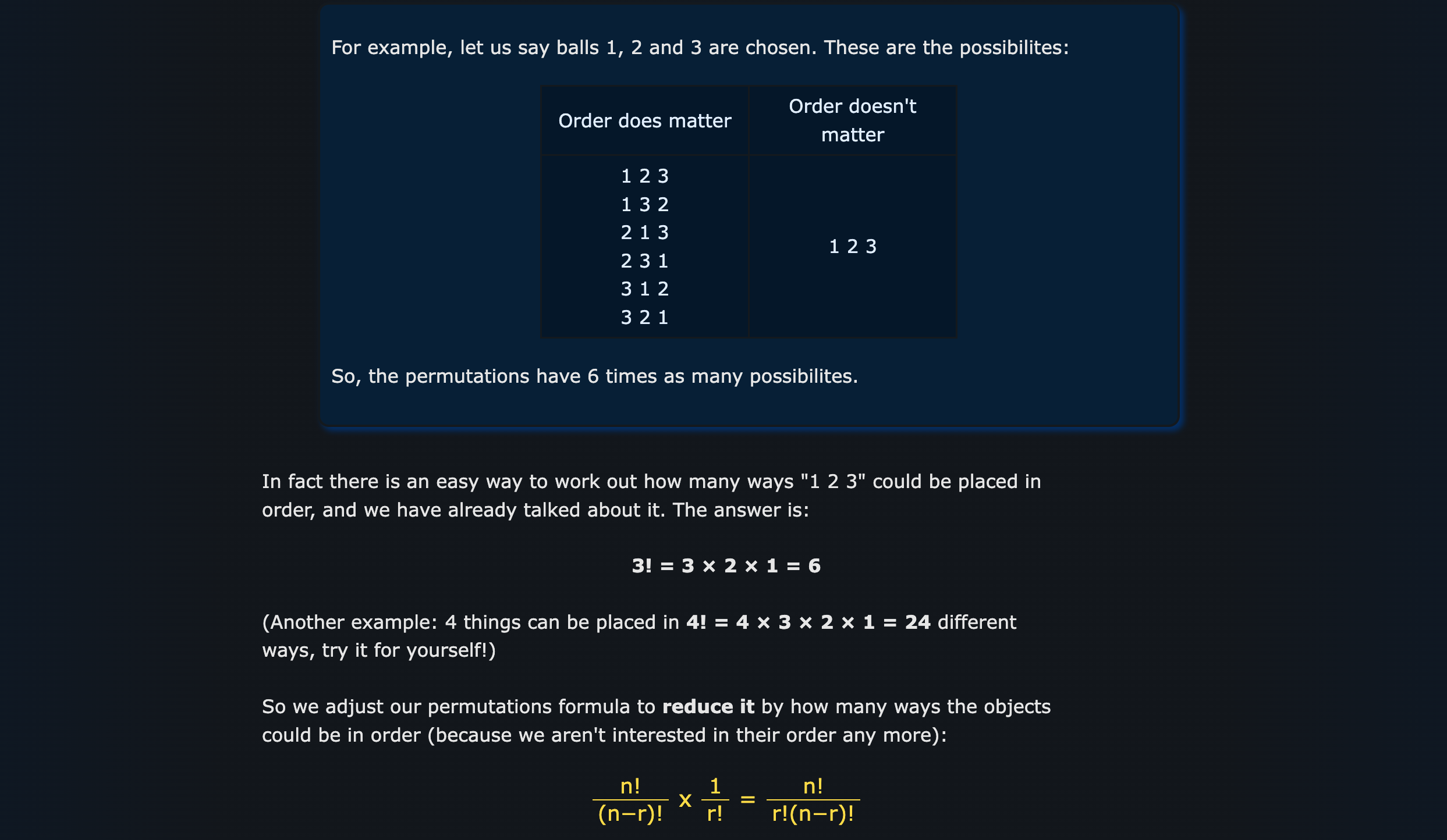
- N!/((N-R)! R!)
- The following problem is from Leetcode - 77. Combinations
- Time complexity: O( n!/(k!*(n-k)!) )
- Space complexity: O(k)
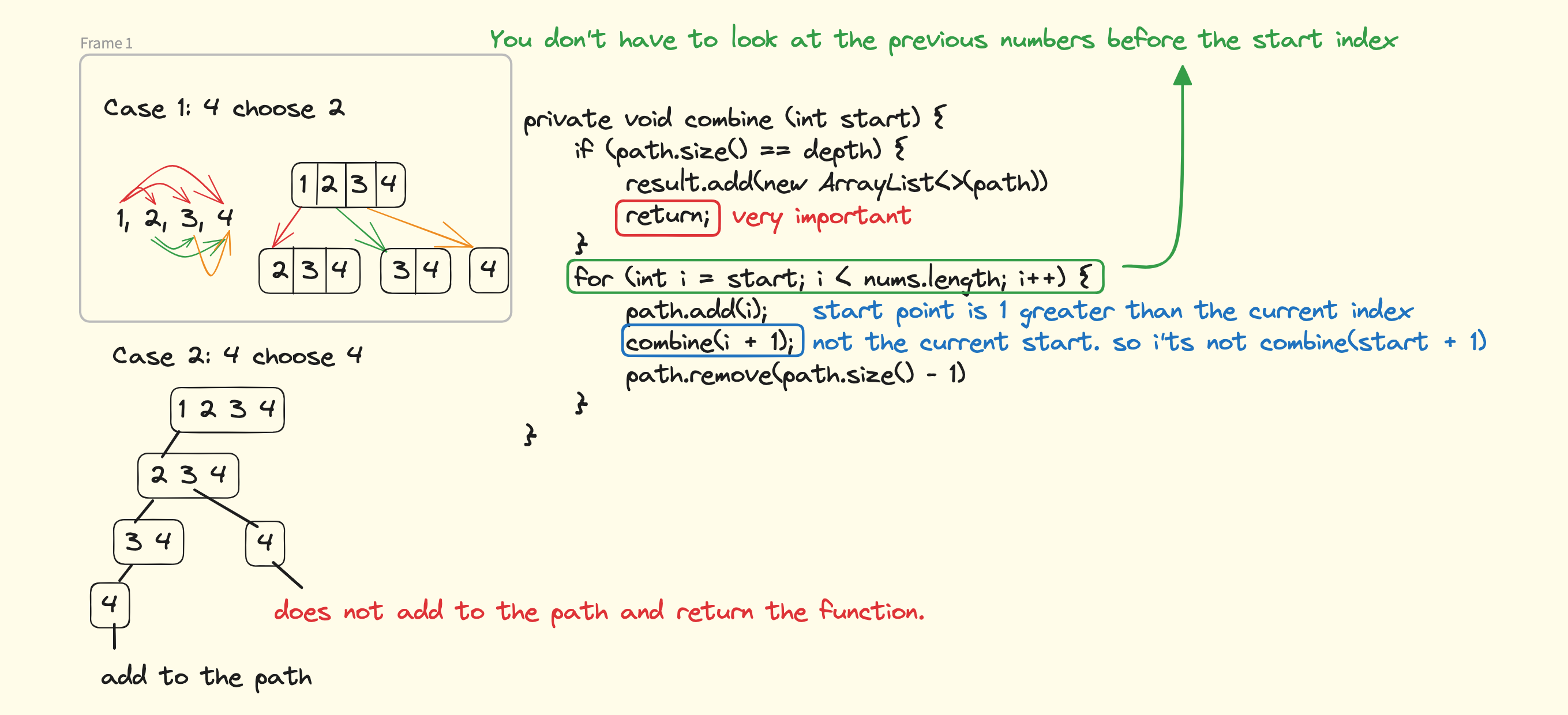
Combination Preorder and Postorder
public List<List<Integer>> combine(int n, int k) {
List<List<Integer>> result = new ArrayList<>();
//combinePreorder(n, 1, k, new ArrayList<>(), result);
//return result;
return combinePostorder(n, 1, 0, k);
}
// TODO: Change the return list to linkedlist from arraylist to reduce time complexity when adding to the front.
private List<List<Integer>> combinePostorder(int n, int start, int depth, int depthLimit) {
if (depth == depthLimit) {
// very important
return new ArrayList<>() {{add(new ArrayList<>());}};
}
List<List<Integer>> siblingWork = new ArrayList<>();
for (int i = start; i <= n; i++) {
List<List<Integer>> childWork = combinePostorder(n, i + 1, depth + 1, depthLimit);
for (List<Integer> childWorkVal : childWork) {
childWorkVal.add(0, i);
siblingWork.add(childWorkVal);
}
}
return siblingWork;
}
private void combinePreorder(int n, int start, int depthLimit, List<Integer> interm, List<List<Integer>> result) {
if (interm.size() == depthLimit) {
result.add(new ArrayList<>(interm));
return;
}
for (int i = start; i <= n; i++) {
interm.add(i);
combinePreorder(n, i + 1, depthLimit, interm, result);
interm.remove(interm.size() - 1);
}
}
preorder
public List<List<Integer>> combine(int n, int k) {
Set<List<Integer>> ans = new HashSet<>();
if (k > n) {
return new ArrayList<>(ans);
}
preorder(n, k, ans, new ArrayList<>());
return new ArrayList<>(ans);
}
private void preorder(int start, int k, Set<List<Integer>> ans, List<Integer> interm) {
if (k == 0) {
ans.add(new ArrayList<>(interm));
return;
}
while (start != 0) { // 3
interm.add(start);
preorder(start - 1, k - 1, ans, interm);
interm.remove(interm.size() - 1);
start--;
}
}
postorder
private List<List<Integer>> postorder(int start, int k) {
// if (start < 0) {
// return new ArrayList<>();
// }
if (k == 0) {
return new ArrayList<>(){{add(new ArrayList<>());}};
}
List<List<Integer>> siblingWork = new ArrayList<>();
while (start != 0) {
List<List<Integer>> childWork = postorder(start - 1, k - 1);
for (List<Integer> list : childWork) {
list.add(start);
siblingWork.add(list);
}
start--;
}
return siblingWork;
}
Combination with repetition
- (R + N - 1)! / (R! (N - 1)!)
- The following problem is from Leetcode - Combination Sum
- Time complexity: O(N*2^N)
- Space Complexity: O(N*k) where k is the average size of the answer
Preorder
public List<List<Integer>> combinationSum(int[] candidates, int target) {
Set<List<Integer>> ans = new HashSet<>();
preorder(candidates, 0, target, ans, new ArrayList<>());
return new ArrayList<>(ans);
}
private void preorder(int[] candidates, int level, int target, Set<List<Integer>> ans, List<Integer> interm) {
if (level == candidates.length) return;
int repeat = 0;
int total = 0;
int cur = candidates[level];
while (total <= target) {
if (repeat != 0) {
interm.add(cur);
}
if (total == target) {
ans.add(new ArrayList<>(interm));
}
preorder(candidates, level + 1, target - total, ans, interm);
repeat++;
total = repeat * cur;
}
// removing siblings from interm
while(--repeat != 0) {interm.remove(interm.size() - 1);}
}
https://leetcode.com/problems/letter-combinations-of-a-phone-number/
Time complexity: O(4^N)
Space complexity: O(4^N * N)
preorder
private String digits;
private Map<Character, String> map;
public List<String> letterCombinations(String digits) {
this.digits = digits;
this.map = new HashMap<>();
map.put('2', "abc");
map.put('3', "def");
map.put('4', "ghi");
map.put('5', "jkl");
map.put('6', "mno");
map.put('7', "pqrs");
map.put('8', "tuv");
map.put('9', "wxyz");
List<String> ans = new ArrayList<>();
if (digits.length() == 0) return ans;
function(0, 0, ans, new StringBuilder());
return ans;
}
private void function(int istart, int order, List<String> ans, StringBuilder sb) {
if (order == digits.length()) {
ans.add(sb.toString());
return;
}
char bundle = digits.charAt(order);
String comb = map.get(bundle);
for (int i = istart; i < comb.length(); i++) {
sb.append(comb.charAt(i));
function(0, order + 1, ans, sb);
sb.deleteCharAt(sb.length() - 1);
}
}
postorder
private List<String> function(int order) {
if (order == digits.length()) {
return new ArrayList<>();
}
char bundle = digits.charAt(order);
String comb = map.get(bundle);
List<String> myWork = new ArrayList<>(); // used by every sibling
for (int i = 0; i < comb.length(); i++) {
List<String> childWork = function(order + 1);
if (childWork.size() == 0) {
myWork.add(comb.substring(i, i + 1));
} else {
for (String s : childWork) {
myWork.add(comb.substring(i, i + 1) + s);
}
}
}
return myWork;
}
- https://leetcode.com/problems/subsets-ii/
- Time Complexity: O(2^N)
- Space Complexity: O(2^N * N)
preorder
public List<List<Integer>> subsetsWithDup(int[] nums) {
Set<List<Integer>> ans = new HashSet<>();
Arrays.sort(nums);
preorder(nums, 0, ans, new ArrayList<>());
return new ArrayList<>(ans);
}
private void preorder(int[] nums, int start, Set<List<Integer>> answer, List<Integer> interm) {
answer.add(new ArrayList<>(interm));
if (start == nums.length) {
return;
}
for (int i = start; i < nums.length; i++) {
interm.add(nums[i]);
preorder(nums, i + 1, answer, interm);
interm.remove(interm.size() - 1); // remove the current node before moving on to the next sibling
}
}
postorder
private Set<List<Integer>> postorder(int[] nums, int start) {
if (start == nums.length) {
Set<List<Integer>> ans = new HashSet<>() {{
add(new ArrayList<>());
}};
return ans;
}
Set<List<Integer>> childWork = postorder(nums, start + 1);
Set<List<Integer>> curWork = new HashSet<>();
for (List<Integer> list : childWork) {
curWork.add(list);
List<Integer> newList = new ArrayList<>(list);
newList.add(nums[start]); // important - the order of which one you add first matters in set
curWork.add(newList);
}
return curWork;
}